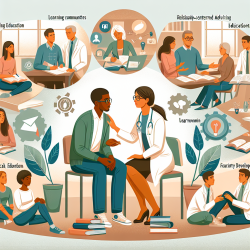Enhancing Educational Outcomes through Relationship-Centered Advising
In the ever-evolving landscape of education, particularly in medical schools, the focus has shifted towards more holistic approaches to student development. The research article "Relationship-Centered Advising in a Medical School Learning Community" by Emily Frosch and Mitchell Goldstein provides a compelling model for implementing relationship-centered advising (RCA) within learning communities (LCs). This approach is not only applicable to medical schools but can also be adapted to other educational settings, including online therapy services for schools like those provided by TinyEYE.
Understanding Relationship-Centered Advising
The RCA model emphasizes the importance of building strong, trust-based relationships between advisors and students. Drawing from best practices in physician-patient relationships, life coaching, and social contract theories, this model fosters a collaborative environment where personal experiences, mutual respect, and earned trust are valued. The core components of RCA include dyadic and small group advising, which are supported by the LC structure, allowing for faculty development in these domains.
Key Elements of the RCA Model
- Personalization: Each advising relationship is tailored to the unique needs and narratives of the student, ensuring a personalized approach to advising.
- Partnership: The advisor-student relationship is seen as a partnership, with mutual respect and understanding as its foundation.
- Trust and Connection: Building trust is paramount, allowing the relationship to grow and evolve over time.
Benefits of Implementing RCA
The implementation of RCA within LCs has shown high levels of satisfaction among both students and faculty. Data from annual student evaluations at Johns Hopkins School of Medicine (JHSOM) indicate a high degree of trust and satisfaction with the advising relationships. This model not only supports students' personal and professional growth but also creates a sense of belonging and connection, fostering feelings of safety and self-efficacy.
Adapting RCA for Online Therapy Services
For practitioners in the field of online therapy services, such as those provided by TinyEYE, the RCA model offers valuable insights. By incorporating relationship-centered advising into therapy sessions, practitioners can enhance the therapeutic experience for children, creating a supportive and trust-based environment. This approach can be particularly beneficial in online settings where building connections may be more challenging.
Encouraging Further Research and Implementation
While the RCA model has demonstrated success in medical education, its principles are adaptable across various educational contexts. Practitioners are encouraged to explore further research on RCA and consider implementing its strategies in their practice. By doing so, they can contribute to improved educational outcomes and student satisfaction.
To read the original research paper, please follow this link: Relationship-Centered Advising in a Medical School Learning Community.










